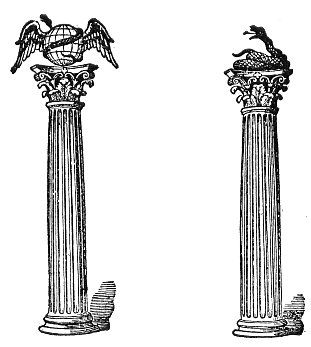We may well say, in the language of Maximus Tyrius: “If, in the desire to obtain some faint conception of the Universal Father, the Nameless Lawgiver, men had recourse to words or names, to silver or gold, to animals or plants, to mountain-tops or flowing rivers, every one inscribing the most valued and most beautiful things with the name of Deity, and with the fondness of a lover clinging with rapture to each trivial reminiscence of the Beloved, why should we seek to reduce this universal practice of symbolism, necessary, indeed, since the mind often needs the excitement of the imagination to rouse it into activity, to one monotonous standard of formal propriety? Only let the image duly perform its task, and bring the divine idea with vividness and truth before the mental eye; if this be effected, whether by the art of Phidias, the poetry of Homer, the Egyptian Hieroglyph, or the Persian element, we need not cavil at external differences, or lament the seeming fertility of unfamiliar creeds, so long as the great essential is attained, THAT MEN ARE MADE TO REMEMBER, TO UNDERSTAND, AND TO LOVE.”
Certainly, when men regarded Light and Fire as something spiritual, and above all the corruptions and exempt from all the decay of matter; when they looked upon the Sun and Stars and Planets as composed of this finer element, and as themselves great and mysterious Intelligences, infinitely superior to man, living Existences, gifted with mighty powers and wielding vast influences, those elements and bodies conveyed to them, when used as symbols of Deity, a far more adequate idea than they can now do to us, or than we can comprehend, now that Fire and Light are familiar to us as air and water, and the Heavenly Luminaries are lifeless worlds like our own. Perhaps they gave them ideas as adequate as we obtain from the mere words by which we endeavor to symbolize and shadow forth the ineffable mysteries and infinite attributes of God.
There are, it is true, dangers inseparable from symbolism, which countervail its advantages, and afford an impressive lesson in regard to the similar risks attendant on the use of language. The
p. 516
imagination, invited to assist the reason, usurps its place, or leaves its ally helplessly entangled in its web. Names which stand for things are confounded with them; the means are mistaken for the end: the instrument of interpretation for the object; and thus symbols come to usurp an independent character as truths and persons. Though perhaps a necessary path, they were a dangerous one by which to approach the Deity; in which “many,” says Plutarch, “mistaking the sign for the thing signified, fell into a ridiculous superstition; while others, in avoiding one extreme, plunged into the no less hideous gulf of irreligion and impiety.”
All great Reformers have warred against this evil, deeply feeling the intellectual mischief arising out of a degraded idea of the Supreme Being: and have claimed for their own God an existence or personality distinct from the objects of ancient superstition; disowning in His name the symbols and images that had profaned His Temple. But they have not seen that the utmost which can be effected by human effort, is to substitute impressions relatively correct, for others whose falsehood has been detected, and to re-place a gross symbolism by a purer one. Every man, without being aware of it, worships a conception of his own mind; for all symbolism, as well as all language, shares the subjective character of the ideas it represents. The epithets we apply to God only recall either visible or intellectual symbols to the eye or mind. The modes or forms of manifestation of the reverential feeling that constitutes the religious sentiment, are incomplete and progressive; each term and symbol predicates a partial truth, remaining always amenable to improvement or modification, and, in its turn, to be superseded by others more accurate and comprehensive.
Idolatry consists in confounding the symbol with the thing signified, the substitution of a material for a mental object of worship, after a higher spiritualism has become possible; an ill-judged preference of the inferior to the superior symbol, an inadequate and sensual conception of the Deity: and every religion and every conception of God is idolatrous, in so far as it is imperfect, and as it substitutes a feeble and temporary idea in the shrine of that Undiscoverable Being who can be known only in part, and who can therefore be honored, even by the most enlightened among His worshippers, only in proportion to their limited powers of understanding and imagining to themselves His perfections,

Moe is the founder of GnosticWarrior.com. He is a father, husband, author, martial arts black belt, and an expert in Gnosticism, the occult, and esotericism.





